Intracytoplasmic sperm injection, commonly referred to as ICSI, is a procedure where individual sperm are injected directly into your egg for fertilization. ICSI is especially helpful in people with low sperm count, sperm motility problems, or poor sperm morphology.
The steps of IVF and ICSI are primarily the same; it is just the process of insemination that is different.
Who needs ICSI?
Most couples who undergo fertility treatment will not require this procedure.
It is typically recommended to couples with male infertility issues. Whether the reason for sperm problems in the male partner is hereditary, medical, or just lifestyle issues, ICSI could be useful.

It may also be recommended to you if you have unexplained infertility issues. This is because failure rates of IVF can be quite high in these cases, and the use of ICSI can increase the chances of success for you.
Am I a candidate for ICSI?
It may be recommended if:
- You have low sperm count
- You have abnormally shaped sperm (poor morphology)
- You have slow moving sperm (poor motility)
- Cases of surgical sperm retrieval – this may be the case if your partner has had a vasectomy, doesn’t ejaculate sperm, or has a very low sperm count
- You need to use frozen sperm, which may be of poorer quality
- You are undergoing embryo genetic testing
- You have had several failed rounds of standard IVF treatment
How is ICSI performed?
While in IVF the sperm and egg together in a dish and the embryologist waits for the sperm to fertilize the egg on it’s on, in ICSI a good quality sperm is selected and directly injected into the egg to ensure fertilization.
A highly skilled embryologist will wash the semen sample and select the best sperm to be directly injected into your egg. The eggs will then be checked the following day for signs of fertilization.
Following on from this, the steps of embryo culture and embryo transfer will be the same as in a standard IVF procedure.

ICSI success rates
This sperm injection procedure has been successful in helping many couples suffering with male infertility factors to achieve a healthy pregnancy. Given that the procedure itself bypasses any issues with the sperm penetrating the egg wall, the rates of fertilization are high.
You can expect a fertilization rate of around 70 to 80 percent. Although, this can vary with the skill of the embryologist, one measure of a good IVF lab is that they are able to achieve 70-80% fertilization with ICSI.
The rates of a successful ICSI pregnancy are similar to those seen with IVF and will vary depending on your age.
However, it can be hard to compare IVF and ICSI directly as there are many additional factors at play.
For example, the quantity and quality of eggs available may be better in ICSI cases as female infertility is not the issue there, and egg quality is a major reason for IVF failure.
Similarly, you may be younger than some patients who are having traditional IVF, allowing for better success rates in this procedure.
Smoking affects ICSI success rates
There are certain lifestyle factors that may play a role in the success of your ICSI cycle too. A study published in Fertility and Sterility in 2003, showed that males who smoke have significantly lowered success rates of ICSI.
For women with non-smoking partners in a controlled group, the success rate of ICSI was 38%, which went down to 22% with smoking partners.

Smoking alters the DNA in sperm, which affects the development of the embryo and results in failure of the ICSI/IVF.
Cost of Intracytoplasmic sperm injection
ICSI is an extra step in the usual IVF procedure—while some clinics charge extra for it, others do not.
The cost can vary depending on the country and clinic that you have the procedure carried out in.
As an example, in the US, ICSI can add $1,500 to the cost of your treatment. The approximate average cost of ICSI is given below:
US: $20,000
UK: £12,000
India: $4,200
Thailand: $7,000
Malaysia: $4,500
Spain: $6,000
Benefits of ICSI
The advantages of ICSI are as follows:
- An increased chance of conceiving if your case involves male infertility issues.
- A better fertilization rate
- ICSI may help to increase your chances of success if you have had previous failed cycles of standard IVF treatment
- Allow you to have a baby even in cases of retrograde ejaculation or surgical sperm retrieval
Risks of ICSI
It is important to also consider the risks of a procedure such as ICSI. These include the following:
- Intracytoplasmic sperm injection is an invasive procedure, there is a small risk of damage to your eggs during the injection process.
NOTE: Some of our associate clinics have a special technique for ICSI—they use a blunt needle so there is no harm to the egg and they are able to achieve 100 percent fertilization success in ICSI - As ICSI is performed alongside standard IVF, there is the usual increased risk of multiple births with this treatment
- There may be an increased risk of developmental and physical health issues with your baby. This is because during natural conception, only the fittest sperm manage to successfully fertilize an egg. As ICSI overwrites this natural sperm selection, it may present increased risks.
This research report published in The Lancet found that although most ICSI-conceived children develop normally, there is a small increase in the risk of mild developmental delay at one year as compared to standard IVF or natural conception. - Besides, you must take note of the standard risks for IVF.
What if ICSI fails?
If your cycle of ICSI fails, you may be recommended to wait for a couple of months before trying further treatment. This is the same advice given after failed cycles of IVF.
This break enables you to recover both physically and emotionally from the trauma of a failed cycle.
You may wish to try additional cycles, if your doctor believes that there is a reasonable chance of success. Alternatively, there are other options that you may wish to consider.
Alternatives to Intracytoplasmic sperm injection
- Intrauterine insemination(IUI) with donor sperm
- IVF cycle with donor sperm
- Adoption
Overall, if you and your partner are struggling to conceive because of male infertility, then ICSI could make a huge difference to your life.
It is important that you understand all of the risks and benefits of the procedure and discuss any issues that you may have with your doctor.